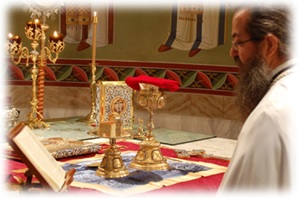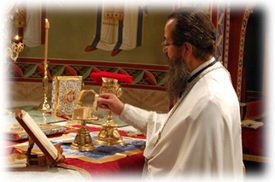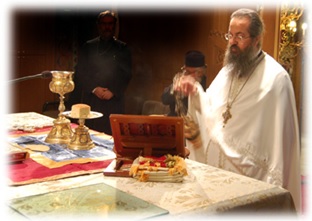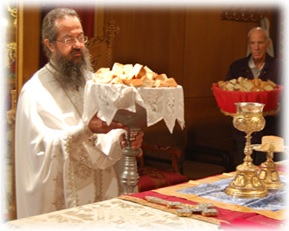The Holy Oblation
4 Ιανουαρίου 2017
This is the main prayer of the Divine Liturgy, at which the blessing of the Precious Gifts and their sacramental transformation into the Body and Blood of Christ takes place. In other words, it’s the most sacred point of the service of the Divine Liturgy.
 It begins with the words ‘It is meet [=proper] and right to hymn you, to bless you, to give thanks to you, to worship you in every place of your dominion’, which are said by the priest before the altar, in a low or normal voice [The instructions simply mean that the prayer isn’t chanted, not that it has to be said ‘in secret’]. After the priest has thanked God for all His blessings towards us (for creating us out of nothing, for raising us up when we fell, for bringing us up to the heavens and admitting us to His Kingdom which is to come and for the liturgy being celebrated), he call us upon us, the people to sing the thrice-holy hymn of the angels: ‘Holy, holy, holy, Lord of Hosts; heaven and earth are full of your glory. Hosanna in the highest. Blessed is he who comes in the name of the Lord. Hosanna in the highest’.
It begins with the words ‘It is meet [=proper] and right to hymn you, to bless you, to give thanks to you, to worship you in every place of your dominion’, which are said by the priest before the altar, in a low or normal voice [The instructions simply mean that the prayer isn’t chanted, not that it has to be said ‘in secret’]. After the priest has thanked God for all His blessings towards us (for creating us out of nothing, for raising us up when we fell, for bringing us up to the heavens and admitting us to His Kingdom which is to come and for the liturgy being celebrated), he call us upon us, the people to sing the thrice-holy hymn of the angels: ‘Holy, holy, holy, Lord of Hosts; heaven and earth are full of your glory. Hosanna in the highest. Blessed is he who comes in the name of the Lord. Hosanna in the highest’.
 Then comes the telling of the way in which the sacrament was passed down from the Lord to His disciples, with the priest repeating Christ’s own words: ‘Take, eat; this is my body, which is broken for you, for the forgiveness of sins’. After the people have said ‘Amen’, the priest continues: ‘Drink of this, all of you; this is my blood of the New Testament, which is shed for you and for many for the forgiveness of sins’. Again the people say ‘Amen’.
Then comes the telling of the way in which the sacrament was passed down from the Lord to His disciples, with the priest repeating Christ’s own words: ‘Take, eat; this is my body, which is broken for you, for the forgiveness of sins’. After the people have said ‘Amen’, the priest continues: ‘Drink of this, all of you; this is my blood of the New Testament, which is shed for you and for many for the forgiveness of sins’. Again the people say ‘Amen’.
The priest then offers the Gifts to Christ: ‘Offering you your own of your own, in all things and for all things’. These are the gifts which Christ has given us and now we offer them back to Him in accordance with what He taught us. The priest then calls upon the Holy Spirit to act, to sanctify the Gifts and transform the bread into the Body and the wine into the Blood of Christ. In some places the people kneel at this point; others bend low, remembering one of the earliest canons of the Church, canon 20 of the 1st Ecumenical Synod, which says that on Sundays and during the season of Pentecost we should not kneel.
Then a hymn is sung: ‘We praise you, we bless you, we give thanks to you, Lord, and we pray to you our God’.
 With great reverence, the priest asks God to send down His Holy Spirit onto the people and the Precious Gifts set forth, so that Holy Communion may be for the forgiveness of our sins and the attainment of His Kingdom. At that moment, the Body and Blood of Christ are on the Holy Altar. Christ is alive and present.
With great reverence, the priest asks God to send down His Holy Spirit onto the people and the Precious Gifts set forth, so that Holy Communion may be for the forgiveness of our sins and the attainment of His Kingdom. At that moment, the Body and Blood of Christ are on the Holy Altar. Christ is alive and present.
 At that time, the priest commemorates all the saints, and all those who have ‘gone to their rest in the faith’, especially the Mother of God, to whom we sing the hymn ‘It is truly meet [= proper] to call you blessed who gave birth to God, ever blessed and most pure and the Mother of our God. Greater in honour than the Cherubim and beyond compare more glorious than the Seraphim, without corruption you gave birth to God the Word, truly the Mother of God we magnify you’. While this hymn is being sung, the priest blesses the bread that will be given to the congregation after the dismissal.
At that time, the priest commemorates all the saints, and all those who have ‘gone to their rest in the faith’, especially the Mother of God, to whom we sing the hymn ‘It is truly meet [= proper] to call you blessed who gave birth to God, ever blessed and most pure and the Mother of our God. Greater in honour than the Cherubim and beyond compare more glorious than the Seraphim, without corruption you gave birth to God the Word, truly the Mother of God we magnify you’. While this hymn is being sung, the priest blesses the bread that will be given to the congregation after the dismissal.





